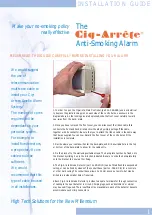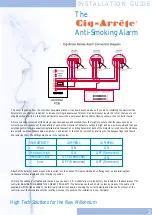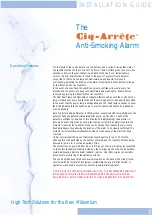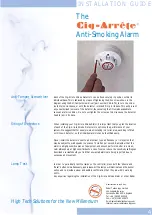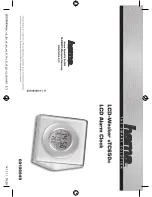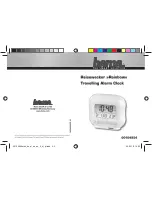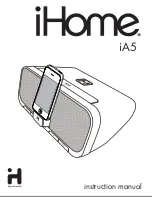
The
Anti-Smoking Alarm
Make your no-smoking policy
really effective
High Tech Solutions for the New Millennium
PLEASE READ THIS GUIDE CAREFULLY BEFORE INSTALLING YOUR ALARM
I N S T A L L A T I O N G U I D E
1
We would suggest
the use of
telecommunication
multi-core cable to
install your Cig-
Arrete Smoke Alarm
System.
The number of cores
required will be
dependant on your
particular system.
For example, to
install five detectors,
a proprietary 8 core
cable would be
sufficient.
We would
recommend that this
type of cable be used
in all installations.
1. In order to open the Cig-arrete Main Controller, (part no. CSA-S5B) use a screwdriver
to depress the plastic locking pins on each side of the controller box as shown in the
diagram above. As the locking pins are depressed, slide the front cover carefully toward
you, away from the back - plate.
2. Once you have removed the front cover, you can disconnect the ribbon cable that
connects the front and back printed circuit boards, by simply pulling off the cable,
together with its connector. Be sure that you re-attach the ribbon cable in the same way
that it was supplied.You can now discard the front cover of the controller until the
installation is complete.
3. Decide where your cables will enter the back-plate, and drill a suitable hole in the top
or bottom of the back-plate to allow for the cable entry.
4. Fix the bracket to the wall using suitable screws.The back-plate can then be fixed onto
the bracket by sliding it on in the direction indicated. Be sure to slide the back-plate fully
onto the bracket to ensure a firm fixing.
5.The Cig-Arrete Smoke Detector (part no. SDI-O1D) can be fitted flush to a suspended
ceiling, or can be fixed by means of the conduit base (part no. CSA-DCB) for a concrete
or other hard ceiling.The conduit base allows 2 x 20mm knock out points, but may be
drilled to provide smaller holes if required.
6. Each Cig-Arrete Smoke Detector provides two spare terminals for through connection
of cabling to the next detector in circuit. Crimping lugs, such as 'Scotchlock' or similar
may be used if required.There is sufficient room available in each of the detector bases to
accommodate such crimp connectors.


